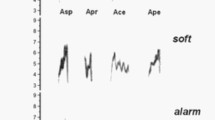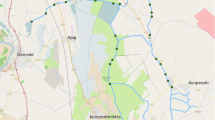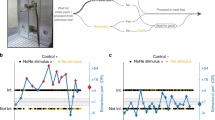Summary
Playback tests were conducted to determine whether black-capped chickadee (Parus atricapillus) flocks recognize the difference between their own calls and those of another flock. The ‘chick-a-dee’ call of the species includes flock-specific acoustic differences that arise, in part, from vocal convergence among flock-members. The call is used in behavioral contexts such as flock territory defense and predator ‘mobbing’, suggesting its importance in coordinating flock behavior. The results show significant differences between responses to foreign and resident calls. Test flocks responded to foreign calls by increasing their own calling rate and decreasing their foraging rate at a feeder set up above the playback speaker. Test flocks' responses to their own calls did not differ significantly from baseline levels of behavior. The significance of flock recognition based on an acoustic signal is discussed.
Similar content being viewed by others
References
Baker MC, Spitler-Nabors KJ, Bradley DC (1982) The response of female white-crowned sparrows to songs from their natal dialect and an alien dialect. Behav Ecol Sociobiol 10:175–180
Beer CG (1970) Individual recognition of the voice in the social behavior of birds. In: Lehrman DS, Hinde RA, Shaw E (eds) Advances in the study of behavior. Academic Press, New York, pp 27–74
Brenowitz E (1981) The effect of stimulus presentation on the response of red-winged blackbirds to playback studies. Auk 98:355–360
Brooks RJ, Falls JB (1975) Individual recognition by song in white-throated sparrows. I. Discrimination of songs of neighbors and strangers. Can J Zool 53:879–888
Feekes F (1982) Song mimesis within colonies of Cacicus c. cela (Icteridae, Aves). A colonial password? Z Tierpsychol 58:119–152
Ficken MS, Ficken RW, Witkin SR (1978) Vocal repetoire of the black-capped chickadee. Auk 95:34–48
Ficken MS, Witkin SR, Weise CM (1981) Associations among members of a black-capped chickadee flock. Behav Ecol Sociobiol 8:245–249
Glase JC (1973) Ecology of social organization in the black-capped chickadee. Living Bird 12:235–267
Mammen DL, Nowicki S (1981) Individual differences and within-flock convergence in chickadee calls. Behav Ecol Sociobiol 9:179–186
Milligan MM, Verner J (1971) Inter-populational song dialect discrimination in the white-crowned sparrow. Condor 73:208–213
Mundinger PC (1970) Vocal imitation and individual recognition of finch calls. Science 168:480–482
Odum EP (1942) Annual cycle of the black-capped chickadee, 3. Auk 59:499–531
Searcy WA, McArthur PD, Peters SS, Marler P (1981) Response of male song and swamp sparrows to neighbor, stranger, and self songs. Behaviour 77:152–163
Snedecor GW, Cochran WG (1967) Statistical methods. Iowa State University, Ames (Iowa)
Thielcke G (1969) Geographic variation in bird vocalizations. In: Hinde RA (ed) Bird vocalizations. Cambridge University Press, Cambridge, pp 311–339
Thorpe WH (1972) Duetting and antiphonal song in birds: Its extent and significance. Behaviour (Suppl) 18:1–197
Verner J, Milligan MM (1971) Responses of male white-crowned sparrows to playback of recorded songs. Condor 73:56–64
Weise CM, Meyer JR (1979) Juvenile dispersal and development of site-fidelity in the black-capped chickadee. Auk 96:40–55
Yasukawa K, Bick EI, Wagman DW, Marler P (1982) Playback and speaker-replacement experiments on song-based neighbor, stranger and self discrimination in male red-winged blackbirds. Behav Ecol Sociobiol 10:211–216
Author information
Authors and Affiliations
Rights and permissions
About this article
Cite this article
Nowicki, S. Flock-specific recognition of chickadee calls. Behav Ecol Sociobiol 12, 317–320 (1983). https://doi.org/10.1007/BF00302899
Received:
Accepted:
Issue Date:
DOI: https://doi.org/10.1007/BF00302899




